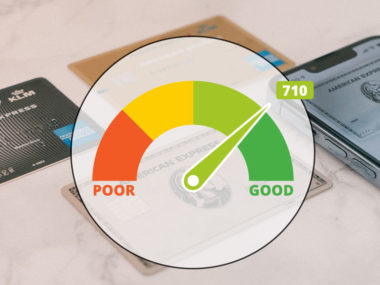A credit score is a statistically determined number that denotes your creditworthiness. The easiest and safest way to see it is by getting a free copy of your annual credit report.
The score ranges from 300 to 850, and the original model for the credit score comes from the Fair Isaac Corporation (FICO).
Different credit reporting agencies have their own categories for translating the score ranges. Here the FICO ranges remain the most widely accepted.
- Poor: 300 to 579.
- Fair: 580 to 669.
- Good: 670 to 739.
- Very Good: 740 to 799.
- Excellent: 800 to 850.
This score depends on your credit history, which includes several components, such as your total debt, open accounts, payment history, and credit utilization. Lenders use that credit score to determine how much risk they will be taking on when they give you a loan.
As you can see from the categories above, a credit score of 620 is considered “Fair.”
Having a fair score leaves you with limited options, and you need to improve it before you can qualify for rewards credit cards or mortgages.
Table of Contents
Why Your Credit Score Is 620
Your credit score depends on a number of factors. It is essential to understand these variables so that you can grasp how you got the score and what you can do to increase your score.
Your Payment History
If you’ve been making your payments on time consistently, your credit score is likely to be high. About 35% of the credit score formula depends on on-time payments. This ratio makes sense because lenders always want borrowers who can pay on time.
Your 620 credit score may be due to payments that were late or missed. To recover your credit, make payments on time each month.
Your Credit Utilization Ratio
Thirty percent of your score depends on your credit utilization ratio. This figure measures how close you are to your credit limit. You can calculate the number by comparing your outstanding balance to your credit limit. You can also calculate the total utilization for all cards by comparing the sum of all balances and all spending limits.
If your overall utilization rate is higher than 30%, it’s likely one of the causes for a low credit score. People with good credit scores tend to have credit utilization ratios under 20%.
Length of Credit History
Time is your friend when it comes to credit. The longer you have had a loan or card, especially if you have a good payment history, the higher your credit score is likely to be. New or newly closed accounts can cause a dip in your credit score.
Avoid closing your credit accounts, especially if you’ve had them for a long time and have a good payment history. A history of closed credit accounts could be one of the factors contributing to your score of 620.
Closing an existing account may reduce your total credit limit and increase your credit utilization ratio, which will affect your score.
Applying for New Accounts
Applying for multiple new credit accounts can harm your credit score in the short term. When you apply for new credit, you assume more risk, which increases the chances that you won’t be able to pay down your debt.
This is another reason why it is better to maintain existing accounts than open new ones.
What Can You Do With a 620 Credit Score?
While a Fair credit score is not a worst-case scenario, the truth is that it leaves you with limited options. Lenders are not likely to approve you for standard loans and they could charge you higher interest rates when you’re approved because they are assuming more risk by lending to you.
You may have to get a loan from a lender specializing in borrowers with bad credit, though the interest rates for those will likely be even higher than a traditional bank.
There are many advantages to improving your credit score to 670 or above. Here are a few limitations you face with a 620 credit score and benefits you might enjoy if you can bring your rating up to “Good” on the FICO scale:
- Your loans are likely to have higher interest rates. Lenders consider you a riskier borrower than one with a better credit score and will mark up the interest to mitigate that risk.
- A score of 620 may translate to higher monthly payments on your loans, especially if you take on personal loans from bad-credit lenders.
- You are less likely to qualify for rewards credit cards with a score of 620. Additionally, you won’t be eligible for 0% annual percentage rate (APR) introductory offers.
- Utility providers will probably require a deposit before they can connect any utilities if your credit score is 620.
- Having a Fair credit score may make it difficult to rent a home or apartment. You may need to make an additional deposit before you can rent.
With a score of 620, it may be challenging to get necessary utilities and services and obtain a place to live. Luckily, there are ways to increase your score so that you are not confronted with these issues in the future.
How to Repair a 620 Credit Score
There are specific steps that you can take to repair a 620 credit score.
- You can pay any outstanding late payment amounts or penalties and then make all your future payments on time.
- Use your credit cards regularly to make payments and pay the card bill in full and on time every month. This strategy will improve your payment history and, consequently, your score.
- Avoid high credit utilization ratios. Ensure your outstanding balance is 30% or less of your spending limit. This percentage should be both per card and in total.
- Consider hiring a credit repair companyto help you build up your credit faster. Credit repair companies help individuals improve their credit scores for a monthly fee.
- Do not submit new applications for credit cards. A credit score of 620 will likely trigger a hard inquiry every time you submit an application, which can hurt your score even more. You can research credit card requirements before applying to ensure that you only attempt to get cards for which you will likely get approved.
- Consider reporting your rent and utilities to the credit bureaus. Recording your monthly rent amounts can provide a better picture of your payment history. A credit repair company can report your rent on your behalf as part of their services.
Image Source: https://depositphotos.com/





